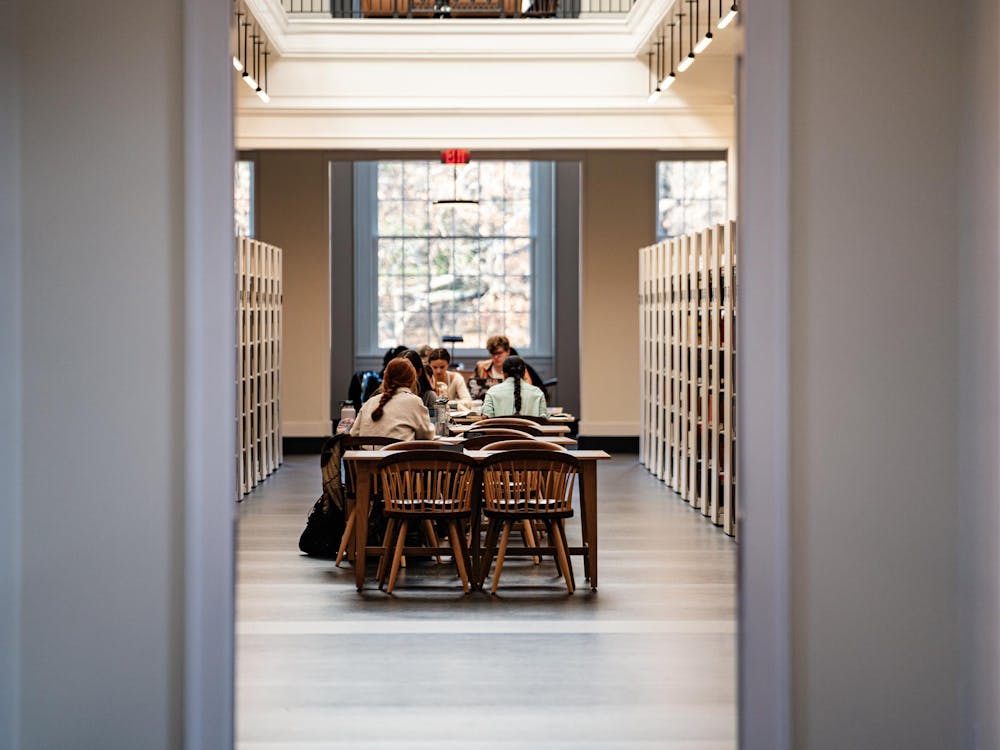The University remains the second-best public university in the nation, according to the annual U.S. News and World Report rankings of the nation's best undergraduate colleges and universities, released Thursday. The University takes its seat right behind Berkley, ranked the best public University in the nation.
The University has remained within the top two spots of the rankings for the past nine years, since the Report began publishing public school rankings as an independent category, according to a press release from University Spokesperson Carol Wood.
The University beat out the University of Michigan, which shared the number two ranking last year, Wood said.
In a comprehensive ranking list including all national universities, both public and private, the University tied for 23 with Georgetown. Harvard and Princeton came out on top, tied as the best universities in the country.
"Our chief strengths are the quality of the student body -- at entry and at graduation, alumni satisfaction with the University and the overall reputation of the University, which is largely a measure of the quality of the faculty," University President John T. Casteen, III said. "One can argue with how U.S. News measures these characteristics, but if one accepts the metrics, then U.S. News uses them in valid ways."
The University showed improvement in several of the Report's ranking subcategories, as well. The University jumped four spots, from 21 to 17 in the list of "Top 25 Great Schools, Great Values" category and the School of Engineering climbed from number 33 to the number 31 spot.
The McIntire School of Commerce received the same ranking it did last year, recognized as the ninth best business program in the nation, tied with the University of Southern California, and the Management Specialty within the McIntire School of Commerce remained ranked the fourth best of its kind in the nation, also unchanged from last year.
While a favorable ranking does indicate a program's good reputation, some question its ability to assess the quality of all schools accurately.
For instance, since business school rankings are based on surveys sent out to the deans of nearly 500 schools nationwide,business school rankings tell little more than how well-known a program is, McIntire Associate Dean Michael Atchison said.
"We use exit surveys through Educational Benchmarking, and we always do very well on that," Atchison said. "We talk to students and alumni and think the results we get from them tell us more than what other deans think."
Regardless of whether or not rankings are an accurate assessment of a program, some say it is important to be aware of them.
"I think there are a lot of opinions about rankings and whether or not they are a good indicator," Engineering School Dean James H. Aylor said. "On the other hand, a lot of people do look at them, and it's important for the community to feel that your programs are of high quality."
Aylor added that he believes the Engineering School's ranking improvement is the result of efforts to add breadth to its undergraduate programming and to market the program in high schools.
According to Wood's press release, faculty and financial resources are categories the rankings highlight as areas of concern for the University. The University did improve slightly in its faculty resources ranking, moving from number 39 to number 36. The University dropped six spots, however, from number 49 to number 55 in financial resources and ranked last among the top 25 universities in the same category.
"Our chief weaknesses are in areas related to financial assets, and these metrics reflect the ongoing deterioration of state tax support," Casteen said.
Despite some concern raised by the recent rankings, University officials seem to sense some light at the end of the tunnel.
"The Higher Education Restructuring Act and the upcoming fundraising campaign will both look to address the resource situation at the University," Wood said. "We've learned that the state can't afford to fund U.Va.'s aspirations, and we are looking for other ways to move forward."
Additionally, the Report's rankings are slightly skewed by a lag time. This year's rankings reflect budget cycles from the 2003-2004 fiscal year, a time when public higher education across the country was facing difficult times, Wood said.
Rankings in the near future should level off from the time of budget crisis for higher education. It may be several years, however, before the University's rankings reflect a "ramping up" as a result of higher education restructuring and fundraising due to the lag time between budget cycles and rankings, Wood said.




